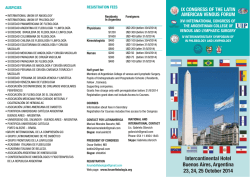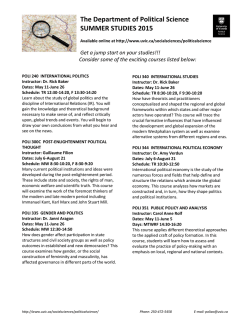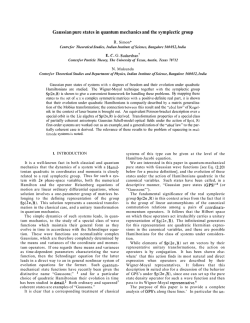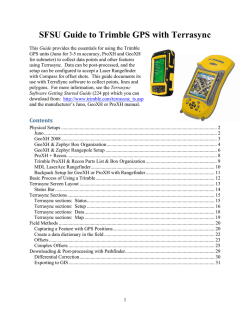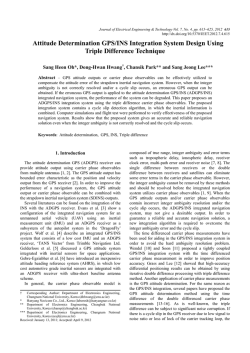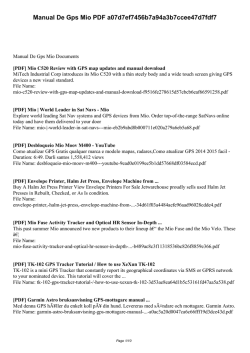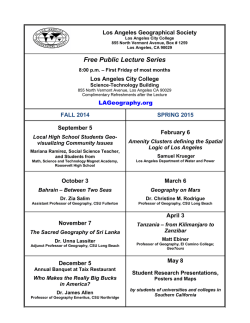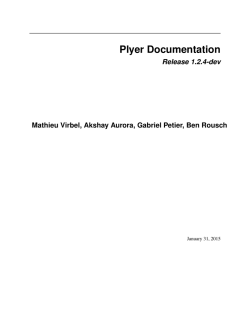
topics in geography - University of Victoria
Department of Geography – University of Victoria Geography 391 – Geocaching and the Global Positioning System February, 2015 COURSE OUTLINE February 9-13, 2015 Instructor: Cathryn R. Brandon ([email protected]) Office: DTB A236 Office hours: By appointment Teaching Assistant: TBA Class Time: Monday-Friday, 9:30 am – 4:20 pm (including 1 hour for lunch) Classroom: Labs: Exam: TBA DTB A251/A253 In-class (TBA): Friday, February 13, 9:30 am – 11:20 am Course Description In May, 2000, the United States government removed “Selective Availability” – the means by which Global Positioning System (GPS) accuracy was intentionally degraded for security reasons. Overnight, the accuracy of civilian GPS systems increased tenfold. Since this time, GPS use has been rapidly integrated into all manners of daily life, including commercial, transportation, and recreational applications. One increasingly popular recreational use of GPS is the activity of geocaching, a high-tech game of ‘hide and seek’ in which users locate hidden containers using coordinates and GPS receivers. The goal of this course is to introduce students to the activity of geocaching, along with the fundamentals of GPS navigation, and GPS data collection. Emphasis will be placed on geocaching, the history and workings of GPS and associated navigation systems, map datums and coordinate systems, and basics of GPS data management. Students will gain hands-on experience operating and working with GPS units in the field, through a variety of geocaching activities and assignments. Examples of the use of GPS in geographical research will be demonstrated through lectures and readings. A final project requires students to create and hunt for geocaches on the UVic campus. This course is suitable for students from any background. Strong participation in a group environment and willingness to be outdoors are fundamental to success in this course. Geog 391: Geocaching Page 1 of 5 Learning Objectives By the end of this course, students should be able to: - Explain basic aspects of coordinate systems and datums; - Discuss the history and development of satellite navigation; - Manage and display personal GPS data using a variety of formats. - Carry out essential functions of a handheld GPS (collecting waypoints, recording tracks, navigating to a position, etc.); and - Participate in both the creation and consumption aspects of geocaching activities. Class Climate The University of Victoria is committed to promoting, providing and protecting a positive and safe learning and working environment for all its members. Students are expected to actively participate in class discussions. Derogatory or foul language will not be tolerated in the classroom. UVic has made a conscientious effort to increase diversity in the student, staff and faculty populations. To ensure all students feel welcome and comfortable in class and group discussions we will all endeavor to be respectful in our language, actions, and examples. Should you have any concerns with the climate of the classroom or any other portions of this course, please don’t hesitate to talk to the instructor or the teaching assistant. Evaluation Evaluation will be based on a combination of in-class worksheet activities, a short writing assignment, a geocache project, and a final exam. The break-down of marks is as follows: Exam = 30% Worksheets = 30% Writing Assignment = 20% Geocache Project = 20% Exam: A closed book exam will be given on the Friday morning of the course. The test will consist of multiple choice, true/false, and short answer type questions. The test will cover material from the lectures (Monday through Thursday) and readings assigned in class. Worksheets: Students are required to complete in-class worksheets as part of applied learning portion of the course. Worksheets will be completed both in the classroom and in the field, using materials provided by the instructor. Class time will be given to complete these worksheets. These will be completed in groups as well as individually. Writing Assignment: At the beginning of the course, the instructors will provide the students with two topics for the writing assignment. Each student will select one (1) topic and prepare a SHORT (approx. 1000 word) essay style response. Students are expected to write at a third-year university level, including proper structure, grammar, and a minimum of three (3) academic references. Limited Geog 391: Geocaching Page 2 of 5 class time may be given for working on this assignment, but completion will occur primarily on students’ own time. Marks will be deducted for not adhering to the word count requirement. Group Geocache Project: Students will work in small groups to complete a geocaching project. This project will consist of the creation of a “cache” on the UVic campus that highlights or showcases some aspect of the campus. Class time will be given to complete this project. Students will search for the caches of their fellow students on the last afternoon of the course. Readings Readings will be assigned in class and will consist of short papers or online articles. Students are expected to read and understand readings as test questions will be drawn from this material. Participation All students are expected to actively participate in class discussions and group projects. Attending class throughout the entire week is integral to successfully completing this course. Late Policy Due to the condensed nature of this course a strict late policy is being enforced with a 25% deduction for each day late for worksheets. Group projects will not be accepted late. Exceptions for missed worksheets and tests will be granted only for medical reasons (requiring a doctor’s note stating your inability to complete the assignment) or other extreme personal crises. Only the instructor may enable these exceptions. DO NOT contact the teaching assistant regarding these matters. Academic Integrity Plagiarism will not be tolerated and dealt with in accordance with university policy. Please review the calendar for details. Be conscious of your writing, and reference any materials you use. If you have any questions don’t hesitate to contact the instructor or the teaching assistant. The instructor reserves the right to use plagiarism detection software programs, web searches, discussions with other instructors, or other methods to investigate evidence of plagiarism in written work. Geog 391: Geocaching Page 3 of 5 Grading Info for Undergraduate Courses* Grades A+ A A- Grade Mark Description (%) 90-100 An A+, A, or A- is earned by work which is technically superior, shows 85-89 mastery of the subject matter, and in the case of an A+ offers original insight 80-84 and/or goes beyond course expectations. Normally achieved by a minority of students. B+ B B- 77-79 73-76 70-72 A B+, B, or B- is earned by work that indicates a good comprehension of the course material, a good command of the skills needed to work with the course material, and the student’s full engagement with the course requirements and activities. A B+ represents a more complex understanding and/or application of the course material. Normally achieved by the largest number of students. C+ C 65-69 60-64 A C+ or C is earned by work that indicates an adequate comprehension of the course material and the skills needed to work with the course material and that indicates the student has met the basic requirements for completing assigned work and/or participating in class activities. D 50-59 A D is earned by work that indicates minimal command of the course materials and/or minimal participation in class activities that is worthy of course credit toward the degree. F is earned by work, which after the completion of course requirements, is inadequate and unworthy of course credit towards the degree. 0-49 Did not write examination or complete course requirements by the end of N term or session *as per 2014-2015 UVIC Calendar F 0-49 Students with a Disability If you have any type of disability there are support systems, resources, and accommodations available to you. If you wish to access any of these services please contact the Resource Centre for Students with a Disability (http://rcsd.uvic.ca/) and we will be happy to work with you to ensure your success in this course. Geography Department Info: Geography Department website: http://geography.uvic.ca/ GEOGPLAN degree planning guide: http://www.geog.uvic.ca/moodle/ [Log in as a guest] Undergraduate Advisor: Dr. Phil Wakefield ([email protected]) Graduate Advisor: Dr. Reuben Rose-Redwood ([email protected]) Geog 391: Geocaching Page 4 of 5 Tentative Course Schedule (specifics may be subject to change) Monday, February 9th • Introduction and course outline • Lecture: Datums and coordinate systems, GPS and Navigation, how to use your GPS o Reading: Ishikawa and Takahashi 2013 • Worksheet #1: Using Handheld GPS (due by 4:30 pm) • Instruction manuals for GPS units will be posted on Course Spaces Tuesday, February 10th • Lecture: Introduction to geocaching o Readings: Neustaedter et al. 2010, O’Hara 2008, Schlatter & Hurd 2005 • Worksheet #2: Managing GPS data (due by 4:30 pm) • Time to work on assignments Wednesday, February 11th • Worksheet #3: Geocaching (due by 4:30 pm) • Time to work on group project Thursday, February 12th • Lecture: Applied GPS o Readings: Goodchild 2007, Dobson and Fisher 2003 • Time to work on group project (due by 4:30 pm) Friday, February 13th • Exam (9:30 am to 11:20 am) • Course Evaluation • Class geocache hunt (finished by 4:30 pm) Geog 391: Geocaching Page 5 of 5
© Copyright 2026

